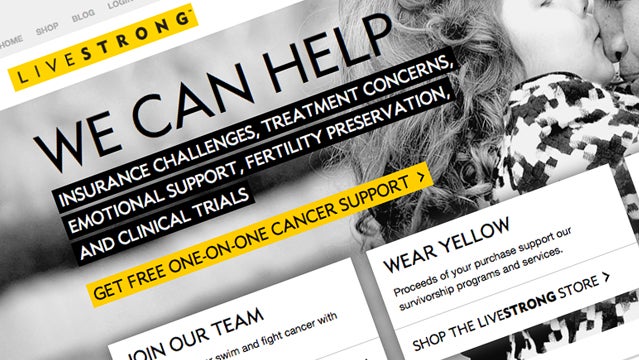Presumably, round two of #Doprah will include ample chatter time about Livestrong. On that subject, the top-shelf required reading is still ŌĆÖs institutional profile of the nonprofit, which ║┌┴Ž│į╣Ž═° published in our February 2012 issue. I held BillŌĆÖs spit bucket when he was working on that story, and itŌĆÖs one that weŌĆÖre all really proud of here. Far from being the hatchet job that Lance and Livestrong howled about at the time, it was a fair assessment of the good, the bad, and the vapid of this famed cancer-fightingŌĆöexcuse me, cancer-awareness-about-raisingŌĆöcharity. Bill also nailed the way Lance would use Livestrong as a survival shield once the arrows started raining down.
It's Not About the Lab Rats
If Livestrong went away, that would be a huge setback in our war against cancer, right? Not exactly.We took a lot of grief from the Austin Death Star when the story was in the works, something IŌĆÖve mentioned now and then on Twitter without going into much detail. IŌĆÖll tell the full story now, not as an example of how brave we were in the face of pressure (though I do think Bill was gutsy throughout), but of how petty Lance and Livestrong could be when they decided to bring it with the bullying tactics. The treatment we got was nothing compared with, say, or . But it was aggressive and tawdry. And itŌĆÖs important to remember that Lance simultaneously signed off on and delegated this kind of thing during his reign, which is the classic mark of a bully whoŌĆÖs also a coward.
The fracas began in early November 2011, when Gifford was still working on the story and I was editing it. LivestrongŌĆÖs general counsel, Mona Patel, sent letters to ░┐│▄│┘▓§Š▒╗Õ▒ŌĆÖs owner (Lawrence J. Burke) and Publisher (Scott Parmelee) trying to quash it, claiming that Gifford and I were both behaving inappropriately and unethically in pursuit of a piece that they assumed would be a hatchet job.
ŌĆ£Mr. Gifford attempted to elicit disparaging remarks about Mr. Armstrong and LivestrongŌĆØ while speaking with sources, Patel claimed, ŌĆ£through leading and misleading questions, suggestions and assurances that they were ŌĆśoff the record.ŌĆÖ … Mr. GiffordŌĆÖs actions could jeopardize LivestrongŌĆÖs relationships with continued support from these partners, supporters and donors as well as tarnish LivestrongŌĆÖs brand reputation.ŌĆØ
Etc. Basically, Gifford was doing his job: asking questions and gathering facts. And I know from talking to him (then and recently) that he was operating in-bounds: making standard-issue queries, doing careful research, and not spilling Iago phials of poison into the ears of his sources, hoping that black smoke would come out of their mouths. He did it that way because heŌĆÖs a professional. Even if he were a sneaky little devil, heŌĆÖs smart enough to have known that any such negative source-greasing would have been reported instantly to LanceŌĆÖs top people at Livestrong, including Doug Ulman, its President and CEO, and Katherine McLane, the media handler.
I already knew that the Livestrong brass were peeved and why, since IŌĆÖd been getting phone messages from Ulman, demanding to speak with me so I could attempt to explain BillŌĆÖs allegedly reckless behavior. (Ulman is very good at huffing and puffing.) I didnŌĆÖt call back, because I assumed UlmanŌĆÖs plan was to chew my ear off for an hour with inaccurate charges. Besides which, I had every intention of making the story fair, as did Bill. We were well aware of the need to maintain balance, and I knew that ░┐│▄│┘▓§Š▒╗Õ▒ŌĆÖs standard factchecking process would give Ulman and Livestrong ample opportunities to voice their concerns and correct any inaccuracies. We also offered to organize a conference call involving them and us, stipulating that whatever was said would be on the record. They passed on that, subsequently referring to this offer as my attempt to “intercept” their request.
Livestrong kept coming, of course. In a letter sent later that month, Patel said that GiffordŌĆÖs ŌĆ£highly inappropriate and … unethical reportingŌĆØ could jeopardize the value of their brand. They wanted phone time with Burke and a response assuring them that our story would not be a smear. ŌĆ£Otherwise, we will seek all equitable and legal remedies in regard to this matter,ŌĆØ Patel wrote. That, as I read it, was a clear threat to sue.
Things got outright weird when had a staffer call BurkeŌĆÖs office to try and set up a conference call involving him, Livestrong reps, and Parmelee, who works out of New York. This person falsely claimed that Parmelee had already been contacted and had agreed to a specific day and time. Parmelee never talked to anybody at Livestrong, so they lied to try and get through to Burke. That was bush league and very dishonest.
Burke, ░┐│▄│┘▓§Š▒╗Õ▒ŌĆÖs founder and owner, was understandably concerned about all this, especially in light of LivestrongŌĆÖs known litigiousness. We assured him the story would be fair, which it was. As we mentioned in the article, we were aware that two other magazines had abandoned in-progress Livestrong reporting because of similar threats. He supported us, the story ran as scheduled, and Livestrong followed up with a lot of loud squawling about how unfair weŌĆÖd been.
For me, the whole thing was an eye-opener: If this was how they behaved when the stakes were relatively low, how rough would they play with someone who really represented a threat? IŌĆÖve never trusted Lance or Livestrong since.


